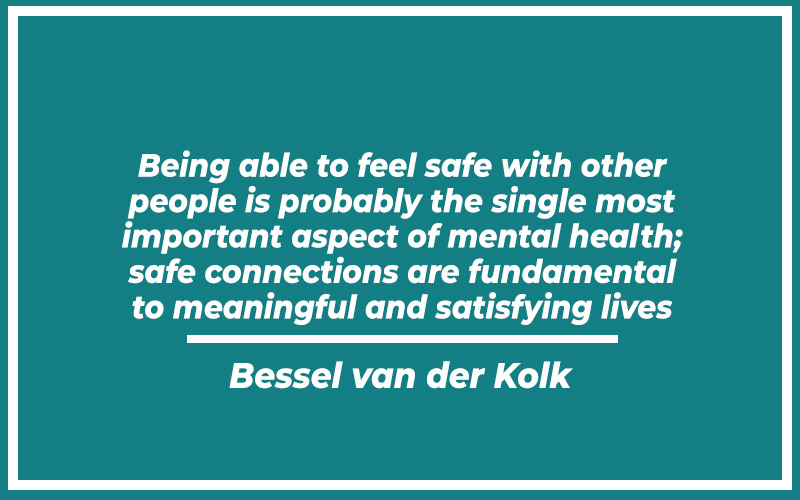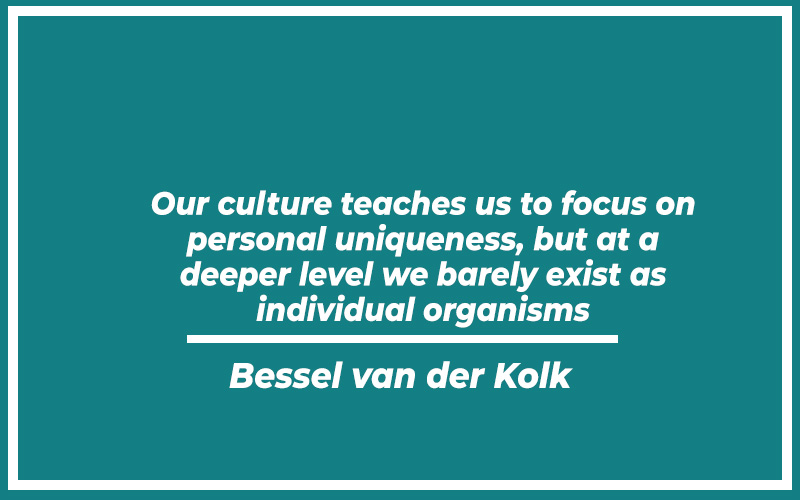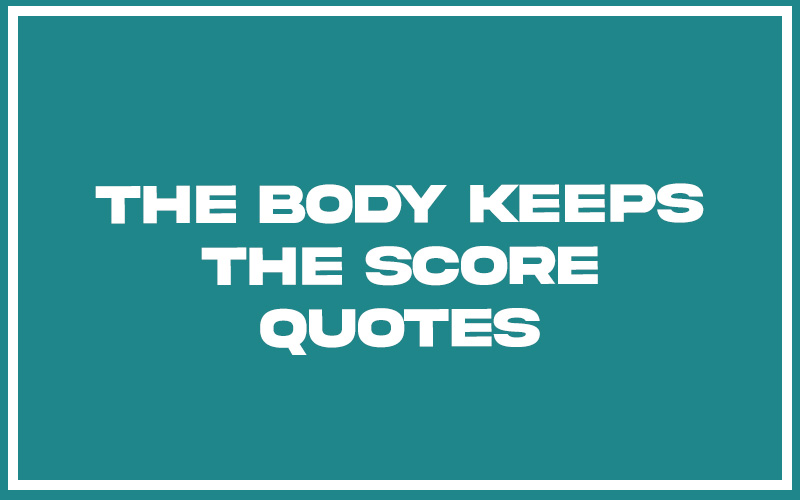Have you ever considered how deeply your experiences, especially traumatic ones, are imprinted in your body?
“The Body Keeps the Score” by Bessel van der Kolk delves into this profound connection between our minds and bodies, exploring how our bodies hold onto past traumas and shape our lives.
Quotes from this influential book can be incredibly eye-opening, helping you understand the impact of trauma and the path towards healing. As you read these quotes, you’ll gain insights into why you might feel or react certain ways and how you can begin to heal from the inside out.
Best The Body Keeps The Score Quotes

“Being able to feel safe with other people is probably the single most important aspect of mental health; safe connections are fundamental to meaningful and satisfying lives.” – Bessel van der Kolk
Bessel van der Kolk emphasizes the importance of feeling safe in relationships for maintaining mental health. His quote suggests that the security we feel in our connections with others profoundly impacts our emotional and psychological well-being.
It prompts us to cultivate environments where safety and trust are prioritized, as these are essential for developing deep and fulfilling relationships that support our mental health.
Also Read: Bob’s Burger Quotes (with Explanation)
“Social support is not the same as merely being in the presence of others. The critical issue is reciprocity: being truly heard and seen by the people around us, feeling that we are held in someone else’s mind and heart.” – Bessel van der Kolk
Van der Kolk differentiates between simple social presence and meaningful social support, which involves a genuine exchange of empathy and understanding. This quote underscores the importance of reciprocal relationships where individuals feel valued and understood.
It suggests that for social interactions to be truly supportive, they must go beyond mere proximity and involve active emotional engagement and mutual acknowledgment.
“Everything about us—our brains, our minds, and our bodies—is geared toward collaboration in social systems. This is our most powerful survival strategy.” – Bessel van der Kolk
Bessel van der Kolk highlights humanity’s intrinsic need for social collaboration, identifying it as a crucial survival mechanism. This quote underlines the evolutionary advantage provided by our capacity to work together, suggesting that our physical and mental wiring is designed to thrive in cooperative environments.
It encourages fostering community and teamwork as fundamental aspects of societal and personal health.
“It takes enormous trust and courage to allow yourself to remember.” – Bessel van der Kolk
Van der Kolk acknowledges the difficulty in confronting painful memories, emphasizing the need for trust and bravery. This quote recognizes the emotional strength required to revisit traumatic experiences for healing purposes.
It highlights the importance of creating a supportive environment that encourages individuals to explore their past, underscoring the role of safety and trust in the therapeutic process.
“Imagination is absolutely critical to the quality of our lives.” – Bessel van der Kolk
Bessel van der Kolk asserts that imagination plays a vital role in enhancing life’s quality. By valuing creativity, individuals can envision and enact a better reality, finding solutions and experiencing joy through imaginative endeavors.
This quote inspires us to cherish and cultivate our creative faculties, recognizing them as essential tools for problem-solving, entertainment, and emotional expression.
“Mindfulness not only makes it possible to survey our internal landscape with compassion and curiosity but can also actively steer us in the right direction for self-care.” – Bessel van der Kolk
Van der Kolk promotes mindfulness as a transformative practice that fosters self-awareness and proactive self-care.
This quote advocates for mindfulness as a means to better understand and nurture oneself, suggesting that such practices enable individuals to respond to their needs with kindness and intentionality. It underscores mindfulness as a pathway to better mental health and personal growth.
“We can hardly bear to look. The shadow may carry the best of the life we have not lived. Go into the basement, the attic, the refuse bin. Find gold there.” – Bessel van der Kolk
Van der Kolk encourages exploring the less examined parts of oneself, suggesting that such introspection can reveal unrecognized potential and unexplored life paths. This quote inspires us to confront our fears and neglected aspects to discover valuable insights about ourselves.
It metaphorically invites us to dig deep into our personal ‘basements’ and ‘attics’ to uncover and reclaim parts of ourselves that have been overlooked or undervalued.
“Traumatized people chronically feel unsafe inside their bodies: The past is alive in the form of gnawing interior discomfort.” – Bessel van der Kolk
Bessel van der Kolk reveals the persistent internal struggle experienced by those with trauma, who often feel a continuous sense of danger and discomfort within their own bodies. This commentary highlights the crucial need for therapeutic interventions that help individuals reconnect safely with their bodies and manage the lingering effects of past traumas.
It emphasizes understanding and addressing the physical manifestations of trauma as essential to recovery, promoting approaches that help individuals feel secure in their bodily experiences again.
“The body says what words cannot.” – Bessel van der Kolk
Bessel van der Kolk emphasizes the body’s role as a communicator of experiences that may be too difficult to articulate verbally. This quote supports the use of body-centered therapies that focus on interpreting and responding to the nonverbal cues emitted by the body.
By paying attention to these physical signals, therapists and patients can work together to uncover underlying issues and promote healing, recognizing that the body holds and expresses key information about one’s psychological state.
“The healing power of being listened to is beyond measure.” – Bessel van der Kolk
Bessel van der Kolk highlights the transformative impact of being attentively and empathetically listened to. This quote underscores the therapeutic importance of listening, which validates individuals’ experiences and feelings, fostering a sense of understanding and acceptance.
It points out that simply providing a supportive space for individuals to voice their thoughts and emotions can significantly aid the healing process, emphasizing that effective communication is foundational to successful therapy.
“Trauma is not just an event that took place in the past; it is also the imprint left by that experience on mind, brain, and body.” – Bessel van der Kolk
Bessel van der Kolk expands the definition of trauma to include not only the original event but also its lasting effects on an individual’s mental, physical, and neurological health.
This commentary stresses the complexity of trauma as a multifaceted condition that requires comprehensive therapeutic approaches. It encourages treatments that address all aspects of an individual’s well-being, recognizing that trauma can alter a person’s life in profound and enduring ways.
“Silence about trauma also leads to death—the death of the soul.” – Bessel van der Kolk
Van der Kolk warns against the dangers of suppressing trauma, suggesting that failing to address traumatic experiences can lead to profound emotional and psychological decay.
This commentary calls for open dialogues about trauma as a means of healing, challenging societal norms that may discourage discussing such issues. It emphasizes that confronting and processing trauma is essential for emotional survival and overall health.
“For real change to take place, the body needs to learn that the danger has passed and to live in the reality of the present.” – Bessel van der Kolk
Bessel van der Kolk discusses the necessity for the body to recognize that traumatic events are no longer occurring in order to heal fully. This quote suggests that therapies should focus on helping individuals distinguish between past traumas and present safety, facilitating a sense of security that is grounded in the current reality.
It highlights the importance of retraining the body’s responses to reduce ongoing hyperarousal and anxiety, enabling individuals to engage more fully with the present moment.
“As long as we feel safely held in the hearts and minds of the people who love us, we will climb mountains and cross deserts and stay up all night to finish projects.” – Bessel van der Kolk
This quote by Bessel van der Kolk illustrates the power of emotional support and connection in driving human resilience and ambition. It asserts that when individuals feel supported and valued by their loved ones, they are capable of extraordinary efforts and achievements.
This commentary celebrates the strength that secure relationships provide, emphasizing that love and support are critical fuels for overcoming obstacles and reaching personal goals.
“Traumatized people chronically feel unsafe inside their bodies: The past is alive in the form of gnawing interior discomfort.” – Bessel van der Kolk
Bessel van der Kolk captures the enduring discomfort that trauma survivors often live with, a constant reminder of past pain that lingers in the body. This quote underlines the importance of addressing not just the psychological but also the physical residues of trauma.
It suggests that healing requires a holistic approach that acknowledges how deeply trauma is embedded in the survivor’s physical experience, advocating for treatments that help individuals reconnect with and feel safe within their bodies.
“The body keeps the score, and it always wins.” – Bessel van der Kolk
Van der Kolk’s assertion highlights the body’s role as a repository for traumatic memories, emphasizing that the physical self records and reacts to experiences independently of cognitive awareness.
This quote underscores the necessity of therapeutic approaches that engage the body as part of the healing process. It challenges us to consider how unresolved trauma can manifest physically and the importance of integrating somatic therapies that address these manifestations.
“Being able to feel safe with other people is probably the single most important aspect of mental health.” – Bessel van der Kolk
This quote emphasizes the fundamental need for safety in relationships for mental well-being. Van der Kolk suggests that without a sense of safety, individuals cannot form meaningful connections or thrive.
The commentary advocates for creating and maintaining relationships that provide emotional and psychological safety, highlighting this as a cornerstone of therapeutic work and healthy community dynamics.
“Our capacity to destroy one another is matched by our capacity to heal one another.” – Bessel van der Kolk
Van der Kolk reflects on the dual nature of human interactions, recognizing that just as we have the potential to inflict pain, we also possess the power to facilitate healing.
This quote encourages a focus on nurturing healing interactions that support recovery and growth. It invites individuals and professionals to leverage their ability to heal, fostering environments that promote rather than inhibit recovery.
“Visceral awareness is the key to recover from trauma.” – Bessel van der Kolk
Van der Kolk points to the importance of visceral, or gut-level, awareness in the process of recovering from trauma. He suggests that tuning into the body’s intuitive signals can guide healing and help individuals regain control over their internal states.
This approach underscores the connection between body awareness and trauma recovery, advocating for therapeutic methods that enhance sensitivity to the body’s cues.
“If you can’t feel it, you can’t heal it.” – Bessel van der Kolk
This straightforward quote from van der Kolk highlights the importance of emotional and physical awareness in healing. It suggests that recognizing and acknowledging painful emotions and sensations is the first step toward recovery.
The commentary supports therapeutic practices that encourage individuals to explore and express their feelings, as a way to facilitate processing and integration of traumatic experiences.
“Self-leadership is about acknowledging our own role in creating our lived reality.” – Bessel van der Kolk
Van der Kolk discusses the concept of self-leadership in the context of recovery, emphasizing the need for individuals to take an active role in shaping their healing journey.
This quote promotes a sense of agency and responsibility in managing one’s path to recovery, encouraging individuals to recognize and use their power to influence their own life outcomes positively.
“Healing doesn’t mean the damage never existed. It means the damage no longer controls our lives.” – Bessel van der Kolk
Bessel van der Kolk’s quote redefines healing not as the erasure of trauma but as the restoration of control over one’s life. This perspective emphasizes that while traumatic experiences may always be a part of one’s history, their impact does not have to dictate one’s future.
It encourages a shift in focus from eliminating trauma to managing its influence, promoting a sense of empowerment and resilience in the face of past pain.
“The greatest sources of our suffering are the lies we tell ourselves.” – Bessel van der Kolk
Van der Kolk addresses the internal narratives that contribute to our suffering, suggesting that the falsehoods we believe about ourselves and our situations often perpetuate our pain.
This quote challenges us to confront and reconsider these narratives, advocating for a more honest self-assessment and acknowledgment of reality as a crucial step toward healing. It promotes introspection and the courage to face and rewrite the stories we tell ourselves.
“Trauma robs you of the feeling that you are in charge of yourself.” – Bessel van der Kolk
By highlighting how trauma can lead to a loss of self-agency, van der Kolk underscores the profound disempowerment that trauma survivors often experience. This quote sheds light on the importance of restoring a sense of personal control and autonomy in the healing process.
It encourages therapeutic approaches that empower individuals, helping them reclaim their sense of self and their ability to make choices about their lives.
“Action is movement with intelligence. The world is filled with movement. What the world needs is more conscious movement, more action.” – Bessel van der Kolk
Van der Kolk calls for thoughtful and deliberate action as a means to make meaningful change, distinguishing it from mere movement. This quote advocates for the importance of intentional, aware actions in both personal growth and societal progress.
It encourages us to think critically about our behaviors and their impacts, promoting a more mindful and proactive approach to the challenges we face.

“Our culture teaches us to focus on personal uniqueness, but at a deeper level we barely exist as individual organisms.” – Bessel van der Kolk
This quote critiques the cultural emphasis on individualism and highlights the interconnected nature of human existence. Van der Kolk suggests that our deeper, fundamental identity is much more collective and interconnected than we might believe.
This perspective encourages us to consider the ways in which we are linked to one another and the importance of community and relationships in our lives.
“Until you can tolerate what you know, you cannot tolerate what you don’t know.” – Bessel van der Kolk
Van der Kolk speaks to the necessity of facing and accepting known truths about oneself and one’s experiences as a prerequisite to dealing with uncertainty or unknowns.
This quote emphasizes the importance of self-awareness and acceptance in managing life’s uncertainties, suggesting that personal growth hinges on our ability to confront and integrate our known experiences before we can effectively handle new challenges.
“Change in the social environment is as critical as therapy for personal change.” – Bessel van der Kolk
Van der Kolk highlights the dual necessity of social and personal transformation for effective healing. This quote acknowledges that while individual therapy is crucial, changes in social conditions that contribute to trauma are equally important.
It calls for a broader approach to healing that includes societal shifts to support and sustain personal growth, underscoring the interconnectedness of personal well-being and the social environment.
Also Read: Rainbow Bridge Quotes (with Explanation)
Final Thoughts
“The Body Keeps the Score” quotes remind you of the resilience of the human spirit and the power of understanding the body-mind connection.
As you reflect on these powerful words, let them guide you towards a deeper understanding of yourself and others who may be dealing with their own hidden battles.
Remember, healing begins with awareness and compassion, and recognizing how profoundly our experiences are etched into our very physiology can be the first step towards recovery. Let these quotes inspire you to take care of your whole self—mind, body, and spirit.

